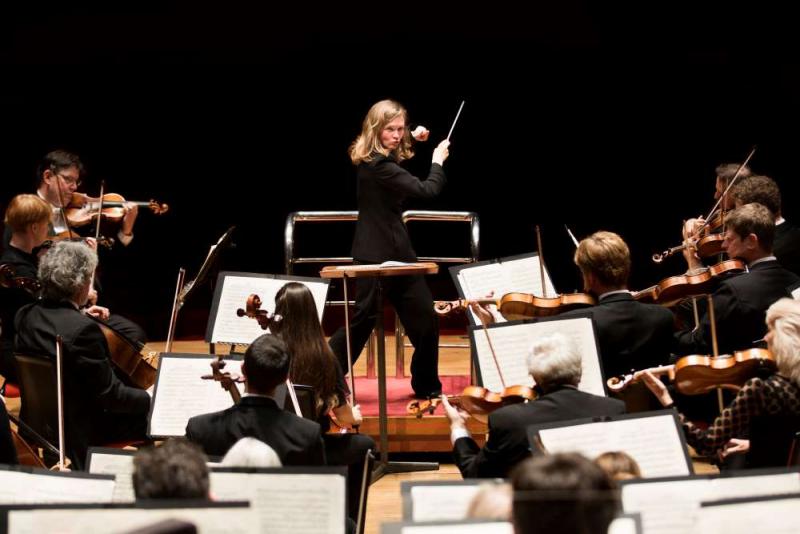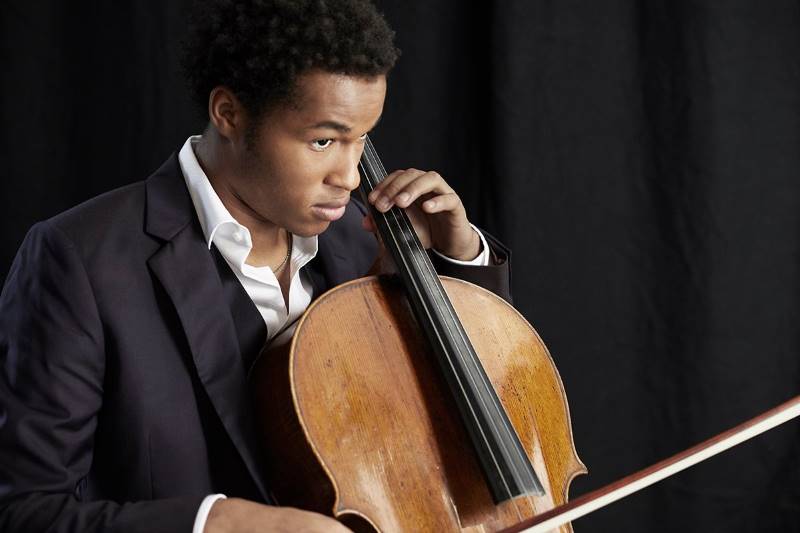Kanneh-Mason, CBSO, Gražinytė-Tyla online review - muted celebrations | reviews, news & interviews
Kanneh-Mason, CBSO, Gražinytė-Tyla online review - muted celebrations
Kanneh-Mason, CBSO, Gražinytė-Tyla online review - muted celebrations
Eloquent playing to an empty hall, as the CBSO marks its centenary in social isolation

“This year was supposed to be so very different” said Stephen Maddock, Chief Executive of the City of Birmingham Symphony Orchestra when he spoke to theartsdesk earlier this year. Talk about an understatement. The CBSO has hardly been alone in having cherished plans wrecked.
Well, if the history of Britain’s orchestras tells us anything, it’s that they generally come back fighting. Many of the 40-odd centenary commissions will doubtless be premiered in future seasons, and several of the big events planned for 2020 will also probably be reinstated – although fans of Granville Bantock and Victor Hely-Hutchinson may now have to wait another century for their moment in the sun. The 100th anniversary of the day – 10 November 1920 – when Sir Edward Elgar conducted the City of Birmingham Orchestra (the “Symphony” bit came later) in its official launch concert was marked with this performance, played behind closed doors without an audience. If an orchestra plays and no-one hears it, does it make a sound? A week later, on BBC Radio 3 (it will subsequently be available on the CBSO’s own website too), this was a chance to find out.
The content of the programme reflected the curious circumstances – with nods to three separate anniversaries crammed into the oddly foreshortened concert format we’ve come to accept as the New Normal. Two of Sibelius’s Lemminkaïnen Legends marked the appearance of Sibelius as a guest conductor in the orchestra’s first season (he stayed at the home of his old friend Bantock in Edgbaston, and by all accounts terrified the children). Beethoven’s Leonore overture No.3 (it’s still the Beethoven anniversary year) provided a suitably upbeat finish to a concert that was, despite everything, a celebration. The only remaining fragment of the original plan was Elgar’s Cello Concerto, one of three of his own works that the composer conducted on that gala night 100 years and one week ago (The others were Falstaff and the Second Symphony – by 1920 standards, an uncompromisingly modern programme). In 2020, it was played by Sheku Kanneh-Mason (pictured below). And for that reason alone, it would be worth waiting to catch the concert when it’s released (from this evening) with visuals on the CBSO’s website. Kanneh-Mason projects such warmth and presence in the concert hall that it felt, unavoidably, as if we were missing a dimension on radio. Indisputable, though, was the way that his tone is growing in beauty and depth, and the increasing focus with which he wields that burnished sound. There was a vintage flavour to his reading: measured, eloquent, with the pulse of his vibrato and the bite of his attack hinting at a passion that, while certainly present, was always under firm control. Gražinytė-Tyla and her players took advantage of the space he opened out to sketch an expansive, twilit landscape. The distinctive colours of a sinking woodwind cadence, a shadowy viola line or an ashen bass pedal all found room to speak, in an interpretation of broad vistas and telling silences.
And for that reason alone, it would be worth waiting to catch the concert when it’s released (from this evening) with visuals on the CBSO’s website. Kanneh-Mason projects such warmth and presence in the concert hall that it felt, unavoidably, as if we were missing a dimension on radio. Indisputable, though, was the way that his tone is growing in beauty and depth, and the increasing focus with which he wields that burnished sound. There was a vintage flavour to his reading: measured, eloquent, with the pulse of his vibrato and the bite of his attack hinting at a passion that, while certainly present, was always under firm control. Gražinytė-Tyla and her players took advantage of the space he opened out to sketch an expansive, twilit landscape. The distinctive colours of a sinking woodwind cadence, a shadowy viola line or an ashen bass pedal all found room to speak, in an interpretation of broad vistas and telling silences.
Possibly the nature of the hall had some bearing: Symphony Hall’s famously pristine acoustic is designed to sound at its most natural with an audience present. Nothing to be done about that, of course, and in The Swan of Tuonela Gražinytė-Tyla made the broadest possible use of that empty space: beginning at the edge of audibility and surrounding Rachael Pankhurst’s poised, pleading cor anglais solo with a broader and more striking range of colours than we usually hear in this piece - from the black, seismic roar of the timpani to the sunlit glint of the harp. She’d opened the concert with Lemminkaïnen’s Homecoming: brisk, bracing, and just as transparent. Back in 2016, a majestic performance of the entire Lemminkaïnen cycle helped win Gražinytė-Tyla her post in Birmingham. But this was a different sort of occasion and the Homecoming served here as a sort of bravura fanfare to open the evening, rather than a triumphant resolution.
That was the function of the Beethoven, and it was here, perhaps, that the absence of an audience (and the energy it generates) was most noticeable. That offstage trumpet sounded very distant indeed; on the other hand, the broad tempi allowed individual players to emerge, unforced, and really characterise the music. The flute and bassoon duet after the trumpet call was Leonore and Rocco to the life. And there was no mistaking the sincerity with which Gražinytė-Tyla shaped the melody of Florestan’s great aria: a song of life and hope from the depths of the grimmest possible lockdown. Not, perhaps, the celebration that the CBSO had planned – but a moving testimony to where we find ourselves in November 2020, nonetheless.
- Available on BBC Sounds and online (with video) from 6pm on Thursday 18 November on the CBSO website.
- More classical music reviews on theartsdesk
rating
Explore topics
Share this article
The future of Arts Journalism
You can stop theartsdesk.com closing!
We urgently need financing to survive. Our fundraising drive has thus far raised £49,000 but we need to reach £100,000 or we will be forced to close. Please contribute here: https://gofund.me/c3f6033d
And if you can forward this information to anyone who might assist, we’d be grateful.

Subscribe to theartsdesk.com
Thank you for continuing to read our work on theartsdesk.com. For unlimited access to every article in its entirety, including our archive of more than 15,000 pieces, we're asking for £5 per month or £40 per year. We feel it's a very good deal, and hope you do too.
To take a subscription now simply click here.
And if you're looking for that extra gift for a friend or family member, why not treat them to a theartsdesk.com gift subscription?
more Classical music
 Jansen, LSO, Pappano, Barbican review - profound and bracing emotional workouts
Great soloist, conductor and orchestra take Britten and Shostakovich to the edge
Jansen, LSO, Pappano, Barbican review - profound and bracing emotional workouts
Great soloist, conductor and orchestra take Britten and Shostakovich to the edge
 Jakub Hrůša and Friends in Concert, Royal Opera review - fleshcreep in two uneven halves
Bartók kept short, and a sprawling Dvořák choral ballad done as well as it could be
Jakub Hrůša and Friends in Concert, Royal Opera review - fleshcreep in two uneven halves
Bartók kept short, and a sprawling Dvořák choral ballad done as well as it could be
 Hadelich, BBC Philharmonic, Storgårds, Bridgewater Hall, Manchester review - youth, fate and pain
Prokofiev in the hands of a fine violinist has surely never sounded better
Hadelich, BBC Philharmonic, Storgårds, Bridgewater Hall, Manchester review - youth, fate and pain
Prokofiev in the hands of a fine violinist has surely never sounded better
 Monteverdi Choir, ORR, Heras-Casado, St Martin-in-the-Fields review - flames of joy and sorrow
First-rate soloists, choir and orchestra unite in a blazing Mozart Requiem
Monteverdi Choir, ORR, Heras-Casado, St Martin-in-the-Fields review - flames of joy and sorrow
First-rate soloists, choir and orchestra unite in a blazing Mozart Requiem
 Cho, LSO, Pappano, Barbican review - finely-focused stormy weather
Chameleonic Seong-Jin Cho is a match for the fine-tuning of the LSO’s Chief Conductor
Cho, LSO, Pappano, Barbican review - finely-focused stormy weather
Chameleonic Seong-Jin Cho is a match for the fine-tuning of the LSO’s Chief Conductor
 Classical CDs: Shrouds, silhouettes and superstition
Cello concertos, choral collections and a stunning tribute to a contemporary giant
Classical CDs: Shrouds, silhouettes and superstition
Cello concertos, choral collections and a stunning tribute to a contemporary giant
 Appl, Levickis, Wigmore Hall review - fun to the fore in cabaret and show songs
A relaxed evening of light-hearted fare, with the accordion offering unusual colours
Appl, Levickis, Wigmore Hall review - fun to the fore in cabaret and show songs
A relaxed evening of light-hearted fare, with the accordion offering unusual colours
 Lammermuir Festival 2025, Part 2 review - from the soaringly sublime to the zoologically ridiculous
Bigger than ever, and the quality remains astonishingly high
Lammermuir Festival 2025, Part 2 review - from the soaringly sublime to the zoologically ridiculous
Bigger than ever, and the quality remains astonishingly high
 BBC Proms: Ehnes, Sinfonia of London, Wilson review - aspects of love
Sensuous Ravel, and bittersweet Bernstein, on an amorous evening
BBC Proms: Ehnes, Sinfonia of London, Wilson review - aspects of love
Sensuous Ravel, and bittersweet Bernstein, on an amorous evening
 Presteigne Festival 2025 review - new music is centre stage in the Welsh Marches
Music by 30 living composers, with Eleanor Alberga topping the bill
Presteigne Festival 2025 review - new music is centre stage in the Welsh Marches
Music by 30 living composers, with Eleanor Alberga topping the bill
 Lammermuir Festival 2025 review - music with soul from the heart of East Lothian
Baroque splendour, and chamber-ensemble drama, amid history-haunted lands
Lammermuir Festival 2025 review - music with soul from the heart of East Lothian
Baroque splendour, and chamber-ensemble drama, amid history-haunted lands
 BBC Proms: Steinbacher, RPO, Petrenko / Sternath, BBCSO, Oramo review - double-bill mixed bag
Young pianist shines in Grieg but Bliss’s portentous cantata disappoints
BBC Proms: Steinbacher, RPO, Petrenko / Sternath, BBCSO, Oramo review - double-bill mixed bag
Young pianist shines in Grieg but Bliss’s portentous cantata disappoints

Add comment